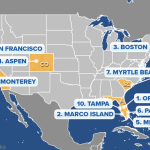
Why Your Hotel Stay May Feel Like a Rip-Off
Hotel stays have long been a cornerstone of travel—the quiet retreat after long journeys, the temporary home as you explore new destinations. However, recent trends in hotel pricing have left many travelers feeling like they’re being nickel-and-dimed at every turn. Hidden charges and unexpected fees for services that were once seen as basic amenities are increasingly common, leaving guests frustrated and confused. In this opinion editorial, we take a closer look at the tricky parts of modern hotel pricing, examine the new à la carte fees being tacked onto your bill, and offer practical advice on how to avoid getting caught out by unnecessary extra costs.
Understanding the New A La Carte Model in Hotels
In recent years, hotels have shifted away from the all-inclusive pricing approach that guests once relied on. Instead, many properties now add extra fees for items like air conditioning, daily housekeeping, Wi-Fi, and even tea or coffee. When resort fees—which were once a catch-all charge covering things such as newspapers, bottled water, and fitness facilities—were finally regulated, the industry quickly responded by breaking down previously included services into separate line items, creating a maze of additional charges.
This change has left many travelers feeling caught off guard. Instead of simply paying one rate for a comfortable stay, guests now have to figure out a labyrinth of charges that may or may not be necessary. The result is a billing process that can feel intimidating and overwhelming, complete with twists and turns that are designed to pad the hotel’s revenue.
Examining the Impact of Hidden Charges on Travelers
Every traveler has a story when it comes to unexpected hotel fees. For example, consider the experience of Victoria Holtz, who stayed at a resort in Fort Lauderdale where the air conditioning wasn’t working. When she called the front desk, the hotel offered to upgrade her to a suite—for a fee. And there are even stories of guests being charged extra to simply exit an elevator when it malfunctioned.
These situations underscore the growing debate over what should be standard in your hotel room and what should be an additional charge. While many hotels in the United States still include essentials like air conditioning, heating, electricity, and running water, recent anecdotal evidence shows that the range of non-included amenities is expanding fast.
Travelers are ultimately left to figure a path through a web of charges that, on paper, seem to split an otherwise straightforward night’s stay into several complicated pieces. The need for transparency in hotel pricing is more pressing than ever as vacationers face bills that do not reflect the initial rates advertised online or over the phone.
How Resort Fees Transformed Hotel Pricing
Let’s take a closer look at a development that sparked the current billing model: resort fees. For over a decade, almost every hotel in the United States and beyond added these fees to cover a variety of amenities. Resort fees were associated with services such as daily newspapers, bottled water, and gym access. The idea was to justify the lower base room rate while still generating revenue from the amenities provided.
However, customers quickly grew frustrated as they realized that the final bill was much higher than what was advertised at the time of booking. These additional charges were often presented as unavoidable add-ons, and many travelers felt deceived by their seemingly “discounted” room rates.
When the government stepped in to demand earlier disclosure of these fees, hotels were forced to include them in the initial price quote. While this regulation offered some relief to consumers, it also set the stage for hotels to pivot towards the more segmented à la carte approach—where every service is priced individually. Now, instead of relying on one all-encompassing charge, travelers must pay for each small twist and turn of the amenities provided during their stay.
What Should Really Be Included in Your Hotel Room?
The burning question for many travelers today is: what should be part of your base room rate? To answer that, we need to break down which items are considered non-negotiable and which ones have started to feel like an unnecessary charge. Here are several key amenities that should be included with no extra fees:
- Reliable Wi-Fi: In 2025, a strong internet connection is practically essential. Whether you’re working remotely or streaming a movie after a long day, charging extra for Wi-Fi seems like a needless money grab.
- Daily Housekeeping: After a long day of travel or exploration, waking up to a clean room is more than a luxury—it’s a must-have service that many expect at no extra cost.
- Potable Water: Clean, drinkable water should be provided for all guests. No traveler should have to pay to stay hydrated, especially when basic tap water is undrinkable.
- Basic Toiletries and Towels: Items like soap, shampoo, and fresh towels are fundamental to a comfortable stay. Most guests believe these should be standard, without hidden fees attached.
- Essential Room Comforts: Electricity, heating, and running water (including hot water) are basic utilities that should not be treated as extras. They belong in the included amenities list for any hotel room.
These simple yet essential services form the backbone of what a hotel should offer its guests. When hotels try to charge separately for such basics, it not only irritates travelers but also disrupts the trust between guests and management.
Understanding the Logic Behind A La Carte Fees
It isn’t entirely surprising, though, to see hotels separating out extra services. With the resort fees now fully disclosed, hotels face pressure to maintain profitability without misleading guests. The move towards an à la carte model can be seen as a way to recoup the revenue lost when bundling all amenities into one base price.
This model allows hotels to charge for every little twist and turn: be it activating air conditioning, taking a sip of complimentary tea, or even using the elevator when it malfunctions. While on the surface some of these charges might seem reasonable, they often add up to a significant sum by the end of your stay, making what was initially a “bargain” rate suddenly expand into an intimidating total.
It is also worth noting that these additional fees are sometimes hidden in standard policies and might only reveal themselves at checkout, leaving guests feeling misled and financially strained. Thus, understanding the rationale behind these practices can help you become more informed as a traveler, making it easier to avoid spending extra dollars on services you didn’t want in the first place.
Common Hidden Charges: A Detailed Look
As hotels begin charging separately for more aspects of your stay, here’s a closer look at some of the most common hidden charges and exactly why they can be problematic:
Air Conditioning Charges
It might sound absurd, but several hotels have started to charge extra for air conditioning – a service that many travelers assume is standard. In hotter climates or during busy summer months, having a functioning air conditioning system is not a luxury but rather a key element for a comfortable stay. When hotels make you pay extra for turning the A/C on, it feels like you’re being charged for breathing. This practice was exemplified by Victoria Holtz’s experience in Fort Lauderdale, where the lack of a working unit forced her to spend an extra $120 a day just to stay cool.
Daily Housekeeping Fees
While many hotels have moved from daily to on-demand housekeeping services in the post-pandemic era, the expectation for a clean room upon request remains. Charging guests extra for what should be a regular service can make travelers feel as if every moment of their stay is being scrutinized for hidden costs. For those who appreciate a tidy room, having to decide between a service that maintains cleanliness and saving money can be a nerve-racking experience.
Internet Access and Communication Fees
Wi-Fi connectivity is more than just a convenience—it’s a necessity in today’s digital age. Yet, some hotels, even upscale ones, have taken to charging for Wi-Fi, which was once seen as a complimentary amenity. This extra fee can be particularly frustrating when budget accommodations offer it for free. It creates an environment where the basic need to stay connected is restricted by additional costs, leaving the traveler stuck figuring a path through constant fees.
Parking Fees and Accessibility Concerns
Parking fees have become a sore spot for many guests. Retired California city worker Edward Winrow, for instance, noted that even mid-range hotels have begun charging for parking—a fee that can become particularly problematic for guests with mobility challenges. Charging extra for handicap parking is not only unreasonable but also raises serious questions about accessibility and fairness.
In-Room Drinks and Beverage Charges
In several cases, hotels have started itemizing charges that were once complimentary. In-room coffee, tea, and even bottled water in some instances have moved from being standard amenities to optional extras. Andy Ellis, a managing director from the United Kingdom, was shocked when he was billed for tea, coffee, and even the small condiments like milk and sugar after checking out of a luxury hotel. This practice turns what should be a hassle-free refreshment into a surprising expense.
Consumer Strategies to Avoid Unexpected Charges
As a seasoned traveler, you can take several steps to reduce the likelihood of being surprised by hidden fees. The key lies in working through the available information and making your expectations abundantly clear before you check in. Here are some practical tips to help you steer through these tricky parts:
- Always Ask Upfront: Before you confirm your booking, be sure to inquire about any potential extra charges. Ask if there are fees for Wi-Fi, housekeeping, parking, or even using the air conditioning.
- Read the Fine Print: Often, the additional fees are hidden in the reservation details or the hotel’s policies. Take a moment to read these aspects carefully.
- Check for Complimentary Indicators: Look for signs that denote complimentary services. A sticker indicating that bottled water or tea is free of charge can save you from an embarrassing moment at checkout.
- Use Trusted Review Sites: See what other travelers are saying about the hotel. Independent reviews can highlight unexpected charges that may not be disclosed on the hotel’s website.
- Compare Your Options: Look at multiple hotels in the area and compare their fee structures. Sometimes, a marginally higher base rate that includes all the amenities may be a better deal in the long run.
By taking these simple steps, you make it easier to get around the hidden costs and ensure that you’re not caught off guard. It’s all about being prepared and informed, which in turn helps you have a more enjoyable and relaxed travel experience.
Table of Common Hotel Charges and Expected Inclusions
| Service | Standard Expectation | Current Trend in Charges |
|---|---|---|
| Wi-Fi | Free and reliable internet | Extra fee in some upscale hotels |
| Housekeeping | Daily cleaning service | On-demand service with additional cost |
| Air Conditioning | Included in room amenities | Sometimes chargeable if not functioning properly |
| Parking | Free parking in most cases | Being charged even at mid-range hotels |
| In-room beverages | Complimentary tea and coffee | Itemized and additional charge |
| Potable Water | Drinkable tap water or complimentary bottles | Sometimes only available at extra cost |
| Basic Toiletries | Soap, shampoo, towels | Occasionally considered extras |
Why Transparency in Pricing is Essential
Honesty in pricing is key to building trust between consumers and service providers. When hotels bundle fees into a single hidden charge, guests often feel deceived when the final bill is much higher than initially quoted. Transparency not only helps travelers budget effectively but also establishes a relationship of trust and clarity that benefits both the hotel and its guests.
Clear, upfront pricing should be the standard. It ensures that consumers know exactly what they are paying for and are not forced to figure a path through a maze of extra costs once they are already checked in. This approach enhances the overall guest experience and reduces friction, allowing everyone to get into the holiday spirit without worrying about mounting fees.
Consumer Rights: The Hotel Room Bill of Rights
To help travelers advocate for themselves, it is useful to think of what should be included in your hotel room as part of a “Hotel Room Bill of Rights.” Below is an outline of the fundamental rights you should have as a hotel guest:
- Access to Reliable Wi-Fi: As a given necessity, the internet should be accessible without surcharges.
- Daily Cleaning Services: A fresh and tidy room is not an optional extra and should be a part of the basic stay.
- Availability of Potable Water: Drinkable water should always be provided at no additional cost.
- Standard Room Utilities: Electricity, heating, and running water (hot or cold) should always be included in the room rate.
- Basic Toiletries and Comfort Items: Items like soap, shampoo, and towels should be available without extra charges.
When hotels try to itemize and charge separately for these essentials, it not only complicates the payment process but may also infringe upon consumer rights. If you feel that a hotel is being opaque about its hidden fees, you have the right to demand a clear breakdown of the charges or even to lodge a complaint with consumer protection agencies. After all, your vacation budget should account for the advertised room rate—not a surprise bill at the end of your stay.
Strategies for Dealing With Hidden Hotel Fees
As consumers become more aware of the extra fees that many hotels impose, it’s important to have strategies in place to avoid these charges. Here are some effective approaches to keep your travel experience stress-free:
Ask Detailed Questions Before Booking
When making a reservation, it’s critical to get into a conversation with the hotel booking agent. Ask detailed questions about what exactly is included in your rate. For instance, if the hotel charges for air conditioning, housekeeping, or even in-room tea and coffee, make sure these service details are provided in writing. Being proactive about clarifying any hidden costs can save you time, money, and the nerve-racking experience of a surprise bill at checkout.
Utilize Consumer Review Sites
Online review platforms and travel forums can be a goldmine of information. Travelers often share experiences involving extra fees that weren’t disclosed in the booking process. Through these platforms, you can find hotels that have earned a reputation for transparent pricing. This form of community vetting can help you figure a path through the confusing bits of hotel pricing.
Be Ready to Walk Away
It is always advisable to have a backup plan. If a hotel tries to charge hidden fees or refuses to be transparent, be prepared to cancel your reservation and look for alternatives. This might mean paying a little more upfront for a hotel that includes all essentials or choosing a well-reviewed budget hotel that doesn’t tack on an array of additional fees. Ultimately, your peace of mind and comfort during your stay are more important than a marginal savings that comes with extra charges.
Leverage Loyalty Programs and Credit Card Benefits
Many hotels offer loyalty programs that provide perks such as complimentary Wi-Fi, free parking, or discounted room upgrades. Additionally, some credit cards associated with travel rewards may also offer benefits that cover extra fees. Taking advantage of these programs can help you get a better overall deal and reduce the incidence of surprise charges on your bill.
The Future of Hotel Pricing: A Call for Change
As the travel industry evolves, there is increasing pressure on hotels to find a balance between profitability and customer satisfaction. The era of hidden fees is becoming more contentious, as well-informed consumers and regulatory bodies push for greater transparency. With consumer advocacy groups and government regulators stepping in to enforce earlier disclosure of charges, hotels may eventually be forced to offer simpler pricing models.
The current model leaves many travelers feeling frustrated and tricked into paying for services they never asked for. It is high time that hotels re-evaluate what truly belongs in the base room rate. After all, a hotel stay is meant to be a relaxing and enjoyable experience, not a scavenger hunt for escaping extra fees.
Advocates argue that all hotels should provide a consistent set of included amenities, ensuring a fair experience for every guest. Until such changes become widespread, it remains critical for travelers to be vigilant, ask the right questions, and know their rights when booking a room.
Personal Experience and Reflections on the Issue
Having spent decades traveling and writing about destinations and accommodations, I have seen firsthand how extra charges can mar an otherwise perfect getaway. On one trip, I booked a charming hotel in Sydney, only to discover at checkout that a charge was added for using the air conditioning—a service I had assumed would be included. Such experiences are more than just inconvenient; they erode trust and leave a bitter taste even after the vacation has ended.
These experiences serve as a reminder that transparency in pricing is not just a bureaucratic requirement, but an essential component of good customer service. Just as you would not be charged extra for essential utilities like water and electricity at home, you should not have to patch your travel experience with hidden charges that were never clearly communicated.
Travel, at its best, should be about exploring new cultures, building memories, and enjoying the comforts of a well-serviced hotel. When every small twist and turn in the bill adds up to an overwhelming or even scary total, the focus shifts from the joy of discovery to worrying about finances. In sharing these reflections, I hope to spark a broader conversation about what truly makes for a fair and enjoyable hotel experience.
Industry Perspectives and the Path Forward
Many in the hotel industry insist that these practices are a necessary response to tighter regulations over resort fees. According to some hotel managers, the segmented pricing model allows for more precise billing for services that not every guest might use. In their view, a traveler who does not use in-room beverages or request daily housekeeping should not be subsidizing those who do.
Yet, this rationale falls short when applied to the basics of a comfortable stay. While it might make financial sense from a business perspective, it leaves consumers with the challenge of sorting through a tangled list of charges at the end of their stay. Without clear, upfront pricing that details these costs, the system seems designed more to obfuscate than to offer choice.
Until a better system is implemented—one that balances clear pricing with flexible service offerings—the responsibility falls on travelers to research, inquire, and advocate for themselves. As the debate continues, a shift toward more consumer-friendly practices would not only improve customer satisfaction but also foster a more sustainable travel industry.
Key Takeaways for the Savvy Traveler
To summarize, here are some critical points to keep in mind when booking a hotel stay in today’s fee-saturated market:
- Expect the Unexpected: Always be prepared for possible extra charges that may not have been apparent at first glance. Ask questions and confirm details before you check-in.
- Know Your Rights: Familiarize yourself with the basic services that should be included in your hotel room. If any of these appear as extra charges, don’t hesitate to question the hotel staff.
- Look for Transparency: Choose hotels and booking sites that are upfront about their pricing, ensuring that the total cost is clearly communicated before you finalize your reservation.
- Leverage Reviews: Use feedback from previous guests to steer clear of establishments known for imposing excessive and unexpected fees.
- Plan and Compare: Sometimes, paying a little extra for a hotel that includes all the basics can be far less stressful than constantly flagging hidden charges during your trip.
Conclusion: Taking Control of Your Travel Experience
The modern hotel pricing model, with its myriad of extra charges, can seem full of problems and tangled issues. However, by being informed and proactive, you can find your way through these confusing bits and prevent your hotel stay from feeling like a hidden fee minefield. Whether you’re traveling for business or leisure, the principles of clear, upfront pricing and good customer service should remain paramount.
Ultimately, the onus is on both consumers and providers to bridge the gap. While hotels continue experimenting with ways to recoup revenue through additional charges, travelers must remain alert and vocal about what should constitute a fair and transparent room rate. Through consumer advocacy, careful research, and a firm understanding of your rights, you can make sure your vacation budget works for you—not against you.
As you plan your next trip, keep these insights in mind. Ask detailed questions, read between the lines of the booking details, and choose establishments that value transparency just as much as you do. After all, honest pricing should be the foundation of any welcoming hospitality experience. By taking the time to learn about the extra charges that might be lurking in the fine print, you ensure that your stay is focused on comfort, exploration, and the joy of travel—not on deciphering a convoluted billing statement.
The journey to a satisfying hotel experience starts with knowledge. So gear up, advocate for clarity, and enjoy your travels without the burden of unexpected fees. Safe travels and happy adventures!
Originally Post From https://www.elliott.org/on-travel/why-your-hotel-stay-feels-like-a-rip-off-and-how-to-fix-it/
Read more about this topic at
How to Avoid 7 Hidden Fees
BBB Tip: How to detect hidden fees in a hidden cost economy


